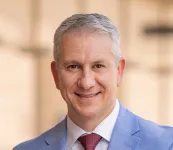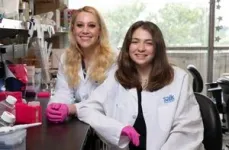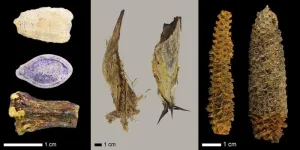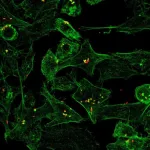(Press-News.org) Mario Romero-Ortega was selected through a nationwide search to head the University of Arizona Department of Biomedical Engineering, beginning with the fall 2023 semester.
“I was drawn by the culture of collaboration, the quality of the students and faculty, and by the unified vision from University of Arizona leadership to impact biomedical engineering and health, from local to global,” he said.
Romero-Ortega will join the College of Engineering from the University of Houston, where he serves in the College of Engineering as a Cullen Endowed Professor of Biomedical Engineering and directs the undergraduate BME program. He is also a professor of biomedical sciences at the Tilman Fertitta J. Family College of Medicine.
“I’m confident Mario will bring strong leadership to BME at an exciting time for the department, including as we seek to expand our collaborations with UA Health Sciences,” said David W. Hahn, the Craig M. Berge Dean of the college. “He will be an asset to a team that is dedicated to improving health, advancing technology, and making the program the best it can be for our students and industry partners.”
First Steps
Romero-Ortega’s top priority is growing the department in a way that places its programs among the world’s topmost for BME. In addition to rankings, success indicators will include the publishing of innovative research, new partnerships with health industry stakeholders, and high levels of student engagement.
“To me, student success includes getting them excited to create solutions beyond the classroom,” he said. “I want to empower students to be the next generation of academic entrepreneurs that will lead the expansion of the health engineering industry in Arizona and the nation.”
Romero-Ortega is particularly excited to lead the department’s upcoming expansion of its bachelor's degree to the Phoenix Bioscience Core and BME’s part in the UA Cancer Engineering Initiative, which is uniting engineers and cancer researchers, among others, in a state-funded effort to improve prevention, diagnosis and treatment of the disease.
A Long-Term Role
Cancer engineering is just one example of why this is “a fascinating time for anybody involved in health care and engineering,” said Romero-Ortega.
“It’s undeniable: Medicine has been transformed by engineering, so much so that advanced medical
programs train doctors in engineering for a complete convergence – not only in the development of tools, but also in their understanding and application,” he said.
As Romero-Ortega considers the future of health care, he sees biomedical engineers working with diverse health professionals and across all engineering disciplines, to provide real-time clinical information and transform care options for patients.
Working together and incorporating tools including artificial intelligence, he says, the biomedical engineering community will create effective electronic devices that continuously collect and transmit diagnostic information. Users will be empowered to detect health conditions early or prevent them altogether.
“I think that shift is where biomedical engineering, and the College of Engineering in particular, will play a critical and empowering role,” he said.
Continuing A Rewarding Path
Romero-Ortega began his career as a neuroscience researcher, and one phone call brought him into biomedical engineering. When a colleague asked him to work on a project that sounded to Romero-Ortega like science fiction, he was fascinated and said yes.
He helped develop an electronic implant designed to allow amputees to move and perceive sensations from bionic arms.
Many years later, Romero-Ortega’s biomedical engineering research focusing on peripheral nerve gap repair, regenerative peripheral neural interfaces for robotic prosthetic limbs, and bioelectronics medicine applications has been presented in more than 192 publications. Winner of the Engineering Excellence in Research Award and the Tech Titans Award in Technology Innovation, he has been awarded seven patents, with additional pending. He is also the cofounder and chief scientific officer of RBI Medical Inc. and Pioneer Neurotech Inc.
Now, heading Arizona’s BME department is “the right combination of an incredible and rewarding opportunity and a challenge.” He and his wife, Martha, look forward to enjoying Arizona’s local cuisine and hiking trails and mountains. The couple have two adult children.
END
Mario Romero-Ortega to lead Biomedical Engineering at the University of Arizona
The new department head's growth vision encompasses accelerating engineering in medicine innovation and empowering student startups
2023-06-23
ELSE PRESS RELEASES FROM THIS DATE:
When majority men respect minority women, groups communicate better
2023-06-23
Kyle Emich, a professor of management at the Alfred Lerner College of Business and Economics, along with Rachel Amey and Chad Forbes, then with UD’s Psychology and Brain Sciences Department, were searching for clues about why women’s knowledge often gets ignored in the workplace and how to improve the situation.
Drawing on both a problem-solving group exercise and measurements of brain activity, their findings, now published by the journal Small Group Research, illustrate ways stereotypes and attitudes can ...
Lessons in sustainability, evolution and human adaptation — courtesy of the Holocene
2023-06-23
The El Gigante rockshelter in western Honduras is among only a handful of archaeological sites in the Americas that contain well-preserved botanical remains spanning the last 11,000 years. Considered one of the most important archaeological sites discovered in Central America in the last 40 years, El Gigante was recently nominated as a UNESCO World Heritage site.
“No other location shows, as clearly as El Gigante,” state UNESCO materials about the site’s universal value, “the dynamic character of hunter-gatherer societies, and their adaptive way of life in the Central ...
New study reveals global reservoirs are becoming emptier
2023-06-23
Water is an essential and indispensable component of humanity’s everyday existence. As the global population grows and the climate warms, so does the water demand.
Over the past two decades, global reservoirs have become increasingly empty despite an overall increase in total storage capacity due to the construction of new reservoirs.
Led by Dr. Huilin Gao, associate professor in the Zachry Department of Civil and Environmental Engineering at Texas A&M University, researchers used a new approach with satellite data to estimate the storage variations ...
Mass General Brigham researchers uncover immune cell marker and regulator of anti-tumor immunity
2023-06-23
B cells are thought to play a critical role in innate and adaptive immunity, but their exact role in anti-tumor immunity remains unknown. Researchers at Brigham and Women’s Hospital with expertise in immunology collaborated with experts in dermatology from Massachusetts General Hospital to further understand the role of B cells and identify a subset of cells that may play a critical role. In collaboration with the Broad Institute they used a technique called single-cell profiling, which allows them to look at all the genes ...
MedTech Innovation Forum Leads Day One at TCT 2023
2023-06-23
NEW YORK & SAN FRANCISCO – June 23, 2023 – Building on the resounding success of last year’s standing-room-only debut, the Cardiovascular Research Foundation (CRF) and Fogarty Innovation are proud to present an even more dynamic and comprehensive TCT MedTech Innovation Forum in 2023. The highly anticipated program will feature additional learning tracks, expanded networking opportunities, increased attendee capacity, and the TCT Shark Tank Innovation Competition. The day-long interactive summit will take place on the first day of TCT 2023 (Transcatheter Cardiovascular Therapeutics), ...
21st century economic growth will be slower than we thought
2023-06-23
Key takeaways:
A new study suggests global future economic growth will be slower than predicted, with developing nations taking longer to close the wealth gap and approach the income of wealthier nations
Governments need to start planning for slower-growth scenarios, which may involve wealthier nations providing lower-income countries with financing for climate change adaptations
National debt and debt-ceiling talks may become more contentious in the coming decades
The global economy will grow slower in the 21st century ...
New analysis: Kaepernick was denied his “right to work” because he, like other Black male athletes before him, challenged structural racism and white supremacy
2023-06-23
A nascent literature is emerging that analyzes the case of Colin Kaepernick who was “locked out” of the National Football League (NFL) beginning in 2017 because he chose to protest police brutality, systemic racism, and white supremacy. Using status expectations states theory and prototypicality theory, this research re-conceptualizes Kaepernick’s lock-out as an infringement on his right to work. First, researchers utilize a modified case-study approach comparing his experiences to those of six other Black male athletes who were “locked out.” Second, researchers utilize data and “matched cases” to demonstrate empirically ...
All the immunity, none of the symptoms
2023-06-23
LA JOLLA (June 23, 2023)—Worldwide, more than a million deaths occur each year due to diarrheal diseases that lead to dehydration and malnutrition. Yet, no vaccine exists to fight or prevent these diseases, which are caused by bacteria like certain strains of E. coli. Instead, people with bacterial infections must rely on the body taking one of two defense strategies: kill the intruders or impair the intruders but keep them around. If the body chooses to impair the bacteria, then the disease can occur without the diarrhea, but the infection can still be transmitted—a process called asymptomatic carriage.
Now, Salk scientists have found that ...
Higher efficiency catalyst key to green hydrogen
2023-06-23
The race to make the widespread use of intermittent renewable energy a reality has taken a step forward with new research by experts from the University of Adelaide who are improving the efficiency of iridium-based catalysts.
“Currently it is difficult for commercial iridium oxide catalysts to achieve high activity and stability at the same time in proton exchange membrane water electrolysis (PEMWE),” said the University of Adelaide’s Associate Professor Yao Zheng, ARC Future Fellow, School of Chemical Engineering.
“We have found that a lattice-water-assisted mechanism – a ...
Drug decelerates bacterial race to antibiotic resistance
2023-06-23
A team of researchers at Baylor College of Medicine is gaining ground in their search for solutions to the global problem of bacterial antibiotic resistance, which was responsible for nearly 1.3 million deaths in 2019.
The team reports in the journal Science Advances a drug that, in laboratory cultures and animal models, significantly reduces the ability of bacteria to develop antibiotic resistance, which might prolong antibiotic effectiveness. The drug, called dequalinium chloride (DEQ), is a proof-of-concept for evolution-slowing drugs.
“Most people with bacterial infections ...
LAST 30 PRESS RELEASES:
COVID-19 vaccination during pregnancy may help prevent preeclampsia
Menopausal hormone therapy not linked to increased risk of death
Chronic shortage of family doctors in England, reveals BMJ analysis
Booster jabs reduce the risks of COVID-19 deaths, study finds
Screening increases survival rate for stage IV breast cancer by 60%
ACC announces inaugural fellow for the Thad and Gerry Waites Rural Cardiovascular Research Fellowship
University of Oklahoma researchers develop durable hybrid materials for faster radiation detection
Medicaid disenrollment spikes at age 19, study finds
Turning agricultural waste into advanced materials: Review highlights how torrefaction could power a sustainable carbon future
New study warns emerging pollutants in livestock and aquaculture waste may threaten ecosystems and public health
Integrated rice–aquatic farming systems may hold the key to smarter nitrogen use and lower agricultural emissions
Hope for global banana farming in genetic discovery
Mirror image pheromones help beetles swipe right
Prenatal lead exposure related to worse cognitive function in adults
Research alert: Understanding substance use across the full spectrum of sexual identity
Pekingese, Shih Tzu and Staffordshire Bull Terrier among twelve dog breeds at risk of serious breathing condition
Selected dog breeds with most breathing trouble identified in new study
Interplay of class and gender may influence social judgments differently between cultures
Pollen counts can be predicted by machine learning models using meteorological data with more than 80% accuracy even a week ahead, for both grass and birch tree pollen, which could be key in effective
Rewriting our understanding of early hominin dispersal to Eurasia
Rising simultaneous wildfire risk compromises international firefighting efforts
Honey bee "dance floors" can be accurately located with a new method, mapping where in the hive forager bees perform waggle dances to signal the location of pollen and nectar for their nestmates
Exercise and nutritional drinks can reduce the need for care in dementia
Michelson Medical Research Foundation awards $750,000 to rising immunology leaders
SfN announces Early Career Policy Ambassadors Class of 2026
Spiritual practices strongly associated with reduced risk for hazardous alcohol and drug use
Novel vaccine protects against C. diff disease and recurrence
An “electrical” circadian clock balances growth between shoots and roots
Largest study of rare skin cancer in Mexican patients shows its more complex than previously thought
Colonists dredged away Sydney’s natural oyster reefs. Now science knows how best to restore them.
[Press-News.org] Mario Romero-Ortega to lead Biomedical Engineering at the University of ArizonaThe new department head's growth vision encompasses accelerating engineering in medicine innovation and empowering student startups




